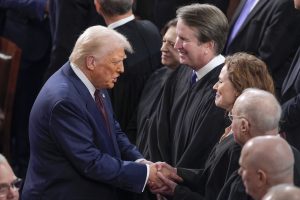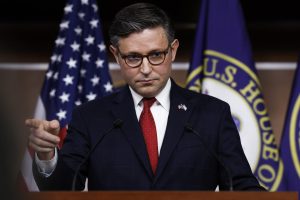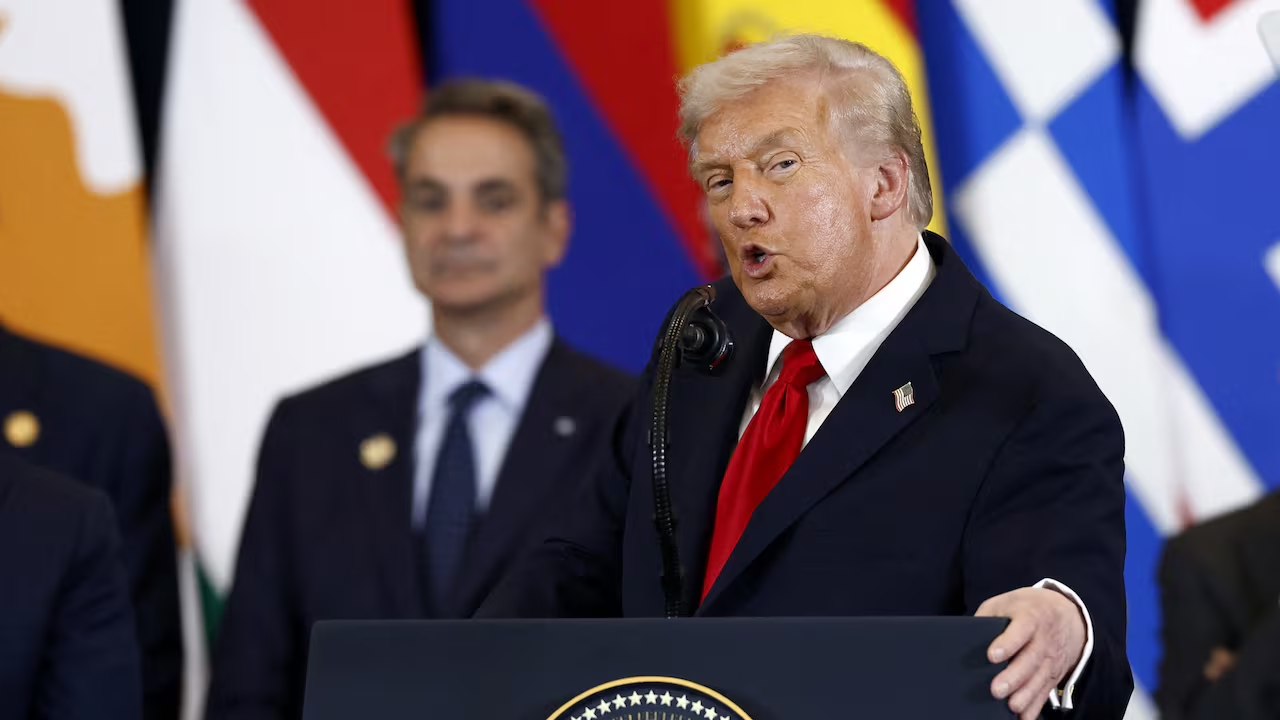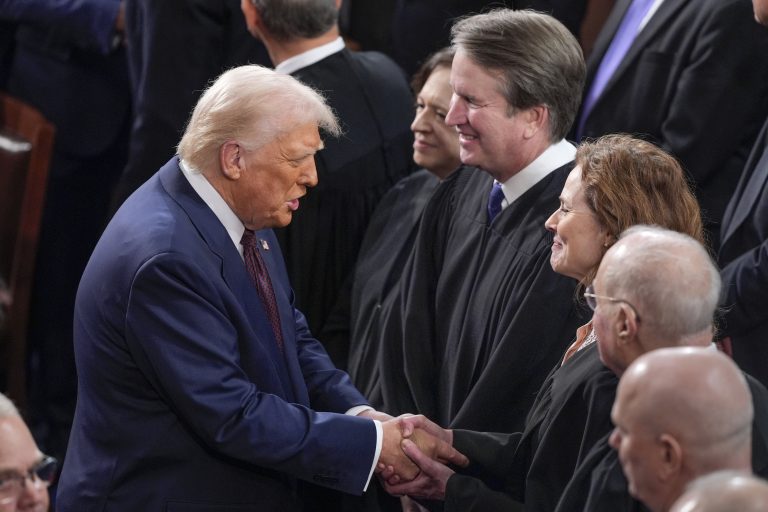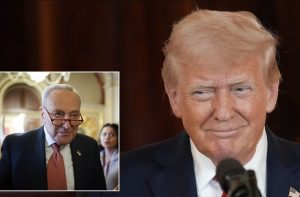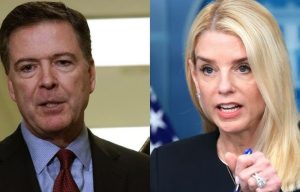Washington, D.C. — A new controversy emerged in Washington this week after President Donald Trump revealed that the use of an autopen under the previous administration is now the subject of an active investigation.
Trump made the remarks during a bilateral meeting at the White House with Argentine President Javier Milei. The discussion, which focused largely on Latin American security and Venezuela’s regional influence, took a turn when the president was asked about the threat of “narco-terrorism” from Venezuelan leader Nicolás Maduro.
The former president’s comments quickly broadened to include criticism of how President Joe Biden’s administration handled official signings and executive clemency actions during his final weeks in office.
“Venezuela has done a couple of things very badly,” Trump said. “They send their criminals into the United States … and because we had a president who’s low IQ, he didn’t realize what was going on.”
Trump went on to accuse Biden of delegating major decisions to aides who used the autopen—a mechanical device that can reproduce a person’s signature—to sign official presidential documents.
“You heard about the Autopen,” Trump said. “The person that really operated the Autopen … those are the people that really were president. And that Autopen thing is under serious investigation.”
Background: What Is the “Autopen”?
The autopen is a long-standing tool used by U.S. presidents to reproduce signatures on official correspondence or approved documents. While it carries full legal authority when properly authorized, its use has often sparked debate about transparency and presidential oversight.
According to internal White House emails obtained by multiple outlets, Biden’s aides used the autopen to sign several warrant documents related to mass clemency decisions made just days before he left office in January 2025.
The emails reveal a flurry of communication among senior aides and Justice Department officials expressing uncertainty about whether Biden personally reviewed or approved every document that bore his autopen signature.
One email from then–White House Staff Secretary Stef Feldman, sent the evening of January 16, 2025, shows she sought written confirmation before proceeding:
“I’m going to need email … confirming P[resident] signs off on the specific documents when they are ready.”
Deputy White House Counsel Tyeesha Dixon later forwarded the message to Michael Posada, chief of staff to the counsel’s office, writing, “He doesn’t review the warrants.”
Posada replied that they would “just need something … making clear that the documents accurately reflect his decision.”
The warrants—covering roughly 2,500 individuals, mostly inmates serving time for nonviolent drug offenses—were signed via autopen hours later, at 4:59 a.m. on January 17.
What’s Under Investigation
While it remains unclear exactly which agency or committee is overseeing the inquiry Trump referenced, several Republican lawmakers have publicly urged the Department of Justice and the National Archives to examine whether the use of the autopen in this context complied with federal recordkeeping and authorization procedures.
Legal scholars note that using the autopen is not inherently improper. The practice has been employed by several past presidents, including George W. Bush and Barack Obama. The key legal requirement is that the president must have personally approved the content of the documents being signed.
If aides authorized autopen signatures on clemency warrants that Biden had not directly reviewed, it could raise questions about procedural compliance — though experts caution that such cases rarely lead to criminal liability unless there is clear evidence of intentional fraud.
In July, Biden acknowledged in comments to The New York Times that he used the autopen in his final days in office due to the sheer volume of clemency documents awaiting approval.
“There were a lot of them,” he said at the time, describing the process as “standard practice.”
Trump’s Remarks Add Political Pressure
Trump’s statements at the White House introduced the issue to a far broader audience, linking the autopen use to what he described as “radical left” influence during Biden’s presidency.
“He barely signed anything,” Trump said. “But the only thing we can find for sure is that he signed Hunter Biden’s pardon.”
White House aides did not immediately respond to requests for comment regarding the president’s claim that a federal investigation is underway. However, sources familiar with internal discussions said the Justice Department’s inspector general and the Office of Special Counsel have both fielded formal requests for review.
Analysts say Trump’s decision to raise the issue publicly could create political complications for Democrats as Congress prepares to reopen oversight hearings into presidential recordkeeping practices.
“Even if it turns out to be fully lawful, the optics of aides signing warrants for thousands of clemency cases are going to resonate with voters who already distrust Washington,” said political analyst Marissa Haines of Georgetown University.
A Broader Debate on Executive Authority
The controversy arrives amid a larger national debate over how modern presidents delegate power within the executive branch. Critics argue that growing reliance on aides and automated systems undermines transparency and accountability.
“Technology has made it easier for presidents to sign off on massive amounts of paperwork without actually seeing it,” said Dr. Evan Carver, a professor of constitutional law at American University. “That’s efficient, but it also blurs the line between approval and abdication.”
Proponents of the autopen, meanwhile, say it is a practical necessity for managing the sheer volume of documents that require presidential authorization—especially when the president is traveling or ill.
Still, even some Biden allies concede that the internal emails reveal disorganization and a lack of clear oversight.
“Those messages don’t look good,” one former staffer said on condition of anonymity. “They show confusion over something that should have been routine.”
What Happens Next
Congressional Republicans are expected to seek testimony from former Biden staffers involved in the clemency process, including Feldman and Dixon. The House Oversight Committee has already issued preliminary requests for correspondence related to the matter.
If the investigation verifies that the autopen was used without full presidential authorization, lawmakers could propose reforms requiring stronger documentation of executive intent in future administrations.
For now, the investigation’s scope remains uncertain — but Trump’s remarks ensure it will stay in the political spotlight.
“We’re not going to stand for it in this country,” Trump said, adding that the American people “deserve to know who’s really running things.”
The White House has yet to comment on the substance of the claims or to clarify whether Biden personally approved each clemency document.

Sarah Mitchell is a bestselling novelist recognized for her insightful and emotionally resonant stories that explore the complexities of human relationships. Originally from Denver, Colorado, Sarah grew up in a family of teachers who nurtured her curiosity and love for storytelling. She studied psychology at Stanford University, where she became fascinated by the intricacies of human behavior—an interest that would later shape her writing career. Sarah’s novels are praised for their nuanced characters, intricate plots, and ability to capture the subtle tensions that define love, friendship, and family ties. Her breakthrough novel, The Spaces Between Us, became an instant bestseller, lauded for its honest portrayal of strained family relationships and the fragile bonds that hold people together. Since then, she has published several works that continue to captivate audiences around the world. Outside of her writing career, Sarah is passionate about mental health advocacy and often partners with organizations to promote awareness and support for those struggling with emotional well-being. Her personal life is quieter—she enjoys hiking in the Colorado mountains, practicing yoga, and spending time with close friends. With each new book, Sarah Mitchell cements her reputation as a writer who illuminates the beauty and struggles of human connection.

